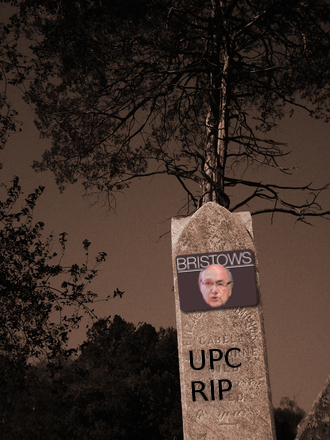

THE UPC is in complete and utter disarray. We hardly ever hear about the UPC anymore, especially since the (in)famous speech of the British Prime Minister. A few days ago we saw Bristows LLP/UPC, a key British component of Team UPC, saying that Richard Gordon's opinion "provides limited comfort" (this was also mentioned in IP Kat, where a lot of the UPC boosters hang out these days)
"We hardly ever hear about the UPC anymore, especially since the (in)famous speech of the British Prime Minister."Who is this of "limited comfort" to? Team UPC, surely. The back room schemers and liars don't want to accept that the UPC is dead, if not only in the UK then in Europe as a whole. As Bristows reveals, it actually sponsored this 'opinion', so it's about as legitimate as those 'studies' Battistelli will present this coming week. To quote Bristows (emphasis ours): "The opinion of Richard Gordon QC and Tom Pascoe (here) has been widely reported as providing reassurance that there are no legal difficulties in the way of the UK participating in the UPC post-Brexit. As one of the sponsors of the opinion, Bristows does not share this viewpoint. The opinion merely reaches its conclusions “on balance” and other views remain perfectly credible. Moreover, it is a purely legal analysis and does not, of course, comment upon the political realities of the requirements it sets forth. The opinion makes it very clear that several boxes would have to be ticked in order to maximise the chances of the CJEU deeming the system legal, which are more or less inconceivable in the present political climate, especially following the Prime Minister’s speech at the recent Conservative Party conference. At least in the short term there is virtually zero chance of the UK ratifying the UPC Agreement, and the real question arising is: what are the longer term prospects for salvaging the UPC project – with UK participation?"
"Bristows is also, unsurprisingly, lobbying for software patents and all things that patent trolls love. It's all about patent and litigation scope. For them, the more the merrier."Nothing. Forget about it. Deal with the fact that you advertised fake jobs that did not exist and probably will never exist. That's how unethical the people of Bristows have become and this is why we don't merely single them out; we just know who the enemy of a sane patent system is. Bristows just wants lots of lots of litigation; that's what Bristows profits from. Don't let them get their way as any litigation comes at the rather great expense of people who actually produce things or buy things. Bristows is also, unsurprisingly, lobbying for software patents and all things that patent trolls love. It's all about patent and litigation scope. For them, the more the merrier.
In other news, patents on genetics have taken a massive blow because according to this new report:
The 9-month-old patent battle over CRISPR, a novel genome-editing tool that could have immense commercial value, has taken two surprising twists.
[...]
In last week’s filing, attorneys for the Broad Institute asked patent officials to remove two of its issued patents that focus on saCas9 from the original case, as well as two other patents (and a few affiliated claims in other patents) that describe techniques for enabling the CRISPR-Cas9 construct to target the nucleus of a eukaryotic cell.
"Patents on life, along with patents on algorithms, are extremely controversial. For good reasons, too."Meanwhile, regarding the EPO Hepatitis C patent/s which we mentioned here the other day (expectation of decision noted a week earlier), there are more articles about the subject [1, 2, 3, 4] and to quote one of them: "Following the development from the EPO, MdM already claims that “the EPO’s decision means that sofosbuvir in itself is not protected by a patent any more.” However, Gilead was quick to refute the claim. STAT news quotes a Gilead spokesman’s statement which maintained the patent."
There are various groups that combat patent maximalism in medicine. One of them the opportunists in the EPO now try to associate with for cheap PR stunts. "To support #MedsPaL," the EPO wrote, "we are working in close collaboration with @inapichile, @EPOorg & @OnapiRD."
Fro those who don't know what MedsPaL is, see this new article from IP Watch. To quote:
A new database was launched this week to facilitate navigation through the patent field and increase transparency surrounding the patent status of medicines and licences.
The Medicines Patent Pool (MPP), Chile’s National Institute of Industrial Property (INAPI), and global health initiative UNITAID held a side event at the WIPO General Assemblies on 5 October. The event was held to present “MedsPaL”, the MPP’s Medicines Patent and Licenses Database, discuss the difficulties in navigating the patent field, and report on the activities by regional and national patent offices, which could inform and build on the new database.
The problem/solution' approach is not officially part of the EPC, but is a criterion which has been developed by case law. It is now is hard to find a decision of the Boards of Appeal which do not rely on the problem/solution approach in order to decide upon inventive step. It looks easy, but when applied, it should be applied correctly. This is not just a formal matter, but a substantial issue of first importance.